Max Weber Foundation Research Group on Borders, Mobility and New Infrastructures
Research foci
Jointly initiated and supported by the German Institute for Japanese Studies (DIJ) in Tokyo, an institute of the Max Weber Foundation (http://www.maxweberstiftung.de/en/ueber-uns.html), the Research Group on Borders, Mobility and New Infrastructures was established in FASS in June 2017.
Our group includes members drawn from the DIJ and three FASS Departments: Geography, Japanese and Southeast Asian Studies. Additionally, we work closely with the Asia Research Institute, especially the Inter-Asia Engagements Cluster. We also collaborate with the Research Cluster on the Belt and Road Initiative that was established within FASS in August 2020.
From November 2021, we have a partnership with the Department of Asian and North African Studies at the Ca' Foscari University, Venice. This is funded by the European Union’s Horizon 2020 research and innovation programme. The research partnership, "CHINGREEN: on the financialization of green: Chinese operations along the Belt and Road Initiative (BRI)" funds one postdoctoral fellow. Details are here: https://pric.unive.it/projects/chingreen/home
We also have a developing collaboration with the Center for Social Development Studies within Chulalongkorn University, Bangkok, Thailand.
Our foci are changing cross-border infrastructures, borderscapes, and new scales and spaces of interaction. We are particularly interested in Japan’s multi-faceted role in Southeast Asia.
Our conception of the relation between “borders” and “mobility” is not restricted to movements across geopolitical borders, but more broadly refers to various arrays of socio-cultural, economic, and political spaces and the crossings that obtain between them. So too, our notion of “infrastructure” is not limited to those physical forms that ground the movement of people, goods, and values across space and time, but also extends to those non-physical networks (e.g. social, business and cultural) that enable everyday processes of commensuration and evaluation. Whilst the role, structure and experiences at state borders have recently become subjects of wide political debate in many regions, the study of borders has deep roots – reflecting nineteenth and twentieth century process of state formation, colonization, empire and conflict that generated a large body of scholarship. Since the 1980s however border studies have been rejuvenated through greater engagement with social and political theory that also responds to changing (bordering and other) process and practices, including (but not limited to) the rise of biometric borders (which shift the border from the state frontier per se, to a range of databases, sites and bodies), cross-border cooperation, European integration (and the evolution of other regional communities elsewhere, such as the Association of South East Asian Nations [ASEAN]), migration and refugee flows, conflict and fortification plus new visions of connectivity (and de/re-bordering?), such as China’s Belt and Road initiative. These contradictory moves belie claims that globalization would yield a ‘borderless world’. Instead the range and number of borderlands and borderscapes have multiplied, along with scholarship about them.
Just as the scope and scale of border studies has widened and deepened, movements of people, ideas and things, as well as the broader social implications of those movements have attracted more scholars under the umbrella of (new) mobility studies. In particular, research under this ambit has embellished understandings of borders as necessary moments of stillness in the control and regulation of flows—both of people and objects, and, on occasions, information. This politics of bordering has crucially given rise to new regimes and methods of government, which have bearings on a wide array of contemporary issues, including labour, infrastructures, the global economy, regionalisation and state power. Further complicating the landscape is a multiplication of border rules (and thus conflicts) pertaining to air- and sea-spaces, ascribing unto national boundaries a three-dimensionality that stretches horizontally and vertically beyond terra firma. We are therefore particularly interested in maritime, terrestrial and aerial routes and the ways that they serve as, in the terms of a classic account of The Political Uses of Access in the Borderlands of Asia (M Z Ispahani, 1989) “both a geographical and political idea, both an end and a means.”
Activities
(for further details, see the interim report of March 2020: here)
In January 2018, we organized - together with the Asia Research Institute (ARI) at NUS - a workshop on “Borders, Mobilities and New Infrastructures in an Age of Shifting Power Configurations”. Details are here. Selected papers from the workshop were published in Environment and Planning C: Politics and Space as a symposium on politics and spaces of China's Belt and Road Initiative. See: https://journals.sagepub.com/doi/full/10.1177/2399654420911410.
From 29 Sep 2018 - 7 Oct 2018, the group hosted (again together with ARI) a Transregional Academy on the theme “Infrastructures, Regions and Urbanizations”. This event was sponsored by the Berlin-based Forum Transregionale Studien. Details are here.
In September 2019, James D Sidaway, along with the group's two postdoctoral fellows, Shaun Lin and Simon Rowedder, attended "The 1st FinGeo Global Conference 2019" in Beijing Normal University, China. Papers from a session at the conference on “Financing the Belt and Road Initiative ” were published as a Research Colloquium in Eurasian Geography and Economics: https://www.tandfonline.com/doi/full/10.1080/15387216.2020.1726787.
Simon was subsequently interviewed by Southeast Asia Globe on the new railway line between Kunming, in China's southwest and Vientiane, the capital of landlocked Laos. The railway, completed in December 2021, is an emblematic project within China's Belt and Road Initiative.
From 2 - 3 December 2019, German Institute for Japanese Studies, Tokyo, hosted six members of the group for a workshop on "Comparisons". The exchanges were then published as blog entries on the open edition platform Hypotheses between May 2020 and May 2021 (https://trafo.hypotheses.org/category/comparing-comparisons). They were re-published in the compact format of an e-book in the DIJ’s Miscellanea series: https://www.dijtokyo.org/publication/comparing-comparisons/
In August 2020, Dr Shaun Lin co-organised an online symposium on "Crossing the River by Feeling the Stones: Alternative Imaginaries of China's Presence in Southeast Asia in Contemporary Contexts" at the Asia Research Institute. Details are here. Selected papers from the symposium will be published in the Singapore Journal of Tropical Geography. Shaun together with Yang Yang (Asia Research Institute), also co-edited a book review forum for Political Geography on Tim Winter's recent book Geocultural Power: China's Quest to Revive the Silk Roads for the Twenty-First Century (University of Chicago Press, 2019).
More widely, Shaun is also working on the geopolitics of public health concerns in Cambodia and Myanmar in relation to their ties with China. See this paper in the Eurasian Journal of Geography and Economics. Shaun has also published reflections on Singapore's responses to COVID-19 in a policy brief for the University of Liverpool's Heseltine Institute for Public Policy, Practice and Place. Elsewhere, Shaun published a paper on geography pedagogy in the Journal of Geography in Higher Education. He is also the current Social Media Editor of Space and Polity, and the Book Review Editorial Assistant of Singapore Journal of Tropical Geography.
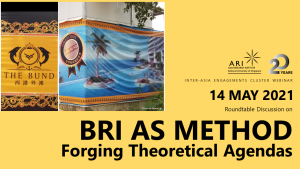 On 14 May 2021, members of the group (Shaun Lin, Naoko Shimazu and James D Sidaway) convened a Roundtable Discussion on “BRI as Method: Forging Theoretical Agendas”, as a precursor to the Third China Made Workshop: The Social Life of Chinese Infrastructures in Southeast Asia. On 20 May 2021, Simon Rowedder presented a paper on local engagements with Chinese promises of infrastructure development in Northern Laos in the Third China Made workshop. This was the final workshop of a three-year initiative, funded by The Henry Luce Foundation, titled “China Made: Asian Infrastructures and the ‘China Model’ of Development.” It was co-hosted by the Center for Asian Studies at the University of Colorado Boulder, the Asia Research Institute at the National University of Singapore, and the Asian Institute at the University of Toronto. Details are here.
On 14 May 2021, members of the group (Shaun Lin, Naoko Shimazu and James D Sidaway) convened a Roundtable Discussion on “BRI as Method: Forging Theoretical Agendas”, as a precursor to the Third China Made Workshop: The Social Life of Chinese Infrastructures in Southeast Asia. On 20 May 2021, Simon Rowedder presented a paper on local engagements with Chinese promises of infrastructure development in Northern Laos in the Third China Made workshop. This was the final workshop of a three-year initiative, funded by The Henry Luce Foundation, titled “China Made: Asian Infrastructures and the ‘China Model’ of Development.” It was co-hosted by the Center for Asian Studies at the University of Colorado Boulder, the Asia Research Institute at the National University of Singapore, and the Asian Institute at the University of Toronto. Details are here.
The Roundtable Presentations can be watched here https://www.youtube.com/watch?v=TxzuHVa38sM.
Selected papers from the event were published as a special section “BRI as Method Forum” in the journal, Asia Pacific Viewpoint.
Two of our research fellows (Shaun Lin and Simon Rowedder) and former postdoctoral fellow, Felix Mallin (now at University of Copenhagen) took part in the Max Weber Foundation conference, "Contested Knowledge in a Connected World", in Berlin in September 2021 (see picture below). They contributed to the conference with the subproject "Interaction and Knowledge in the Pacific Region: Entanglements and Disentanglement" in cooperation with GHI Moscow, GHI Washington and DIJ Tokyo. Simon and Felix also participated in a further network meeting of this research project held online in December 2021.
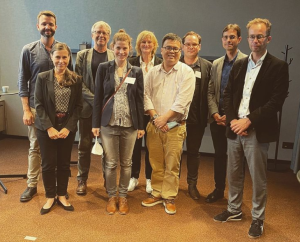
From December 2021, Simon Rowedder is based in the Chair of Development Politics at the University of Passau’s Faculty of Arts and Humanities: https://www.phil.uni-passau.de/en/lehrstuehle/development-politics/ He remains a member of the research group.
One of our members, Dr Weiqiang Lin was awarded a Singapore Ministry of Education (MOE) Social Science and Humanities Research (SSHR) Fellowship for a project entitled, “Peopling Infrastructure: Aeromobilities, Automation and Labour Mobilisations in Asia” in 2019. The study runs from 2020 to 2025. More info about the project can be found here: https://fass.nus.edu.sg/srn/2021/03/08/peopling-infrastructure-aeromobilities-automation-and-labour-mobilisations-in-asia.
From August 2022, Dr Shaun Lin will take up a teaching position at NUS College (see: https://nuscollege.nus.edu.sg/). Following Shaun’s departure, the Research Group on Borders, Mobility and New Infrastructures will be wound down and replaced by a new Research Partnership on Asian Infrastructures hosted by ARI, in partnership with The Deutsches Institut für Japanstudien. For details of the new Research Partnership, see: https://ari.nus.edu.sg/research/partnerships/.
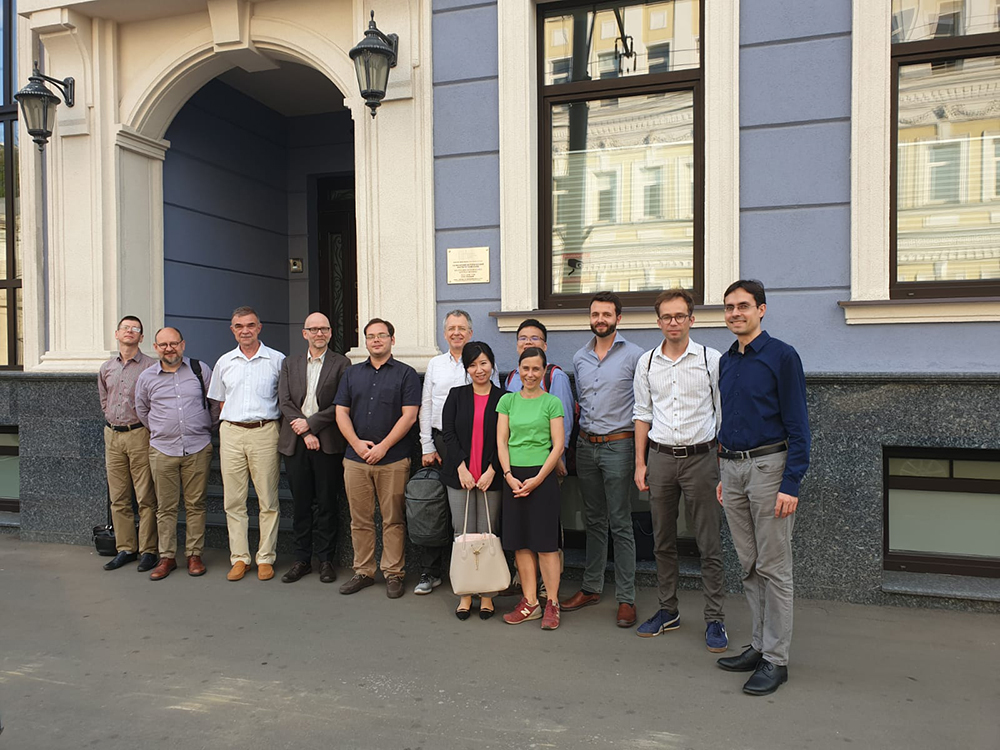
Three of our postdoctoral fellows (Shaun Lin, Felix Mallin, and Simon Rowedder) took part in a network meeting, "The Pacific Space as a space of knowledge and interaction? Questions, concepts, and actors” at the German Historical Institute Moscow, 21-22 June 2019. This is part of a larger Max Weber Foundation research project on "Interactions and Flows of Knowledge: Entanglement and Disentanglement Processes in the Pacific Region".
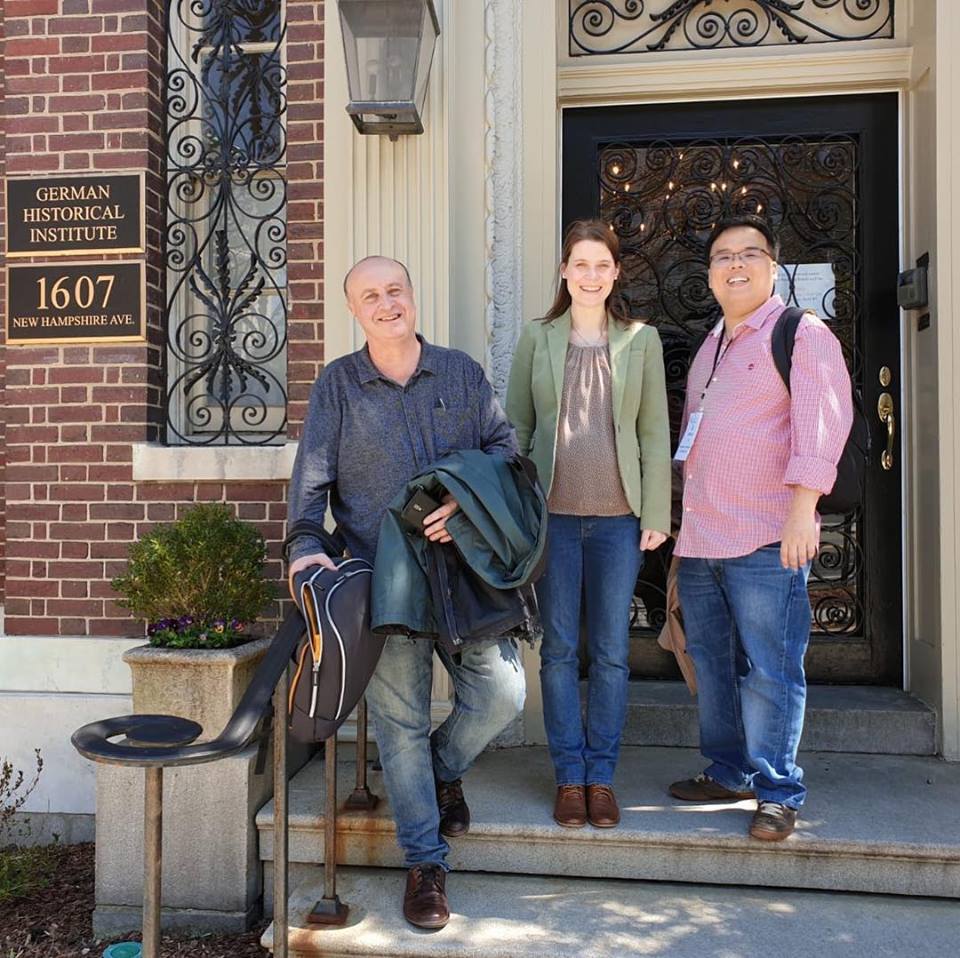
Shaun Lin and James D Sidaway visited the German Historical Insititute (GHI) Washington when they attended the American Association of Geographers conference in April 2019. They were warmly received by Dr Sarah Beringer, Head of Strategy, who gave them a tour of the beautiful institute surrounded by embassies.
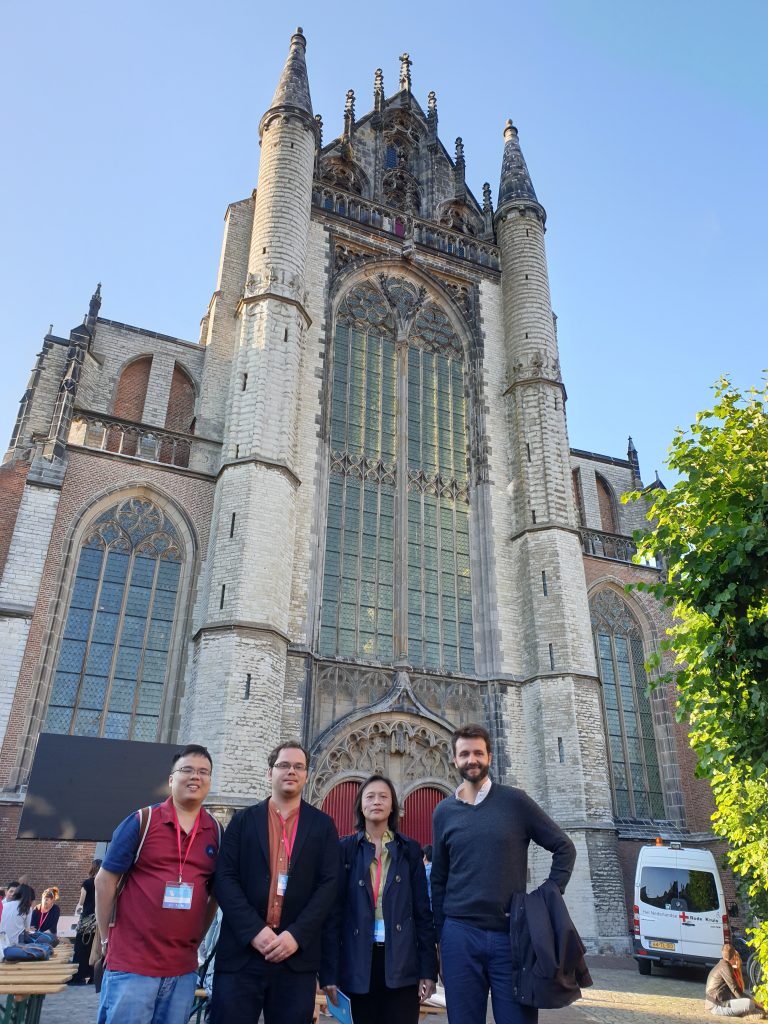
Three of our postdoctoral fellows (Shaun Lin, Felix Mallin, and Simon Rowedder) and Vatthana Pholsena of the Centre Asie du Sud-Est (CASE), Centre National de la Recherche Scientifique (CNRS), Paris, took part in the 11th International Convention of Asia Scholars (ICAS 11) in Leiden, the Netherlands, from 16-19 July 2019.
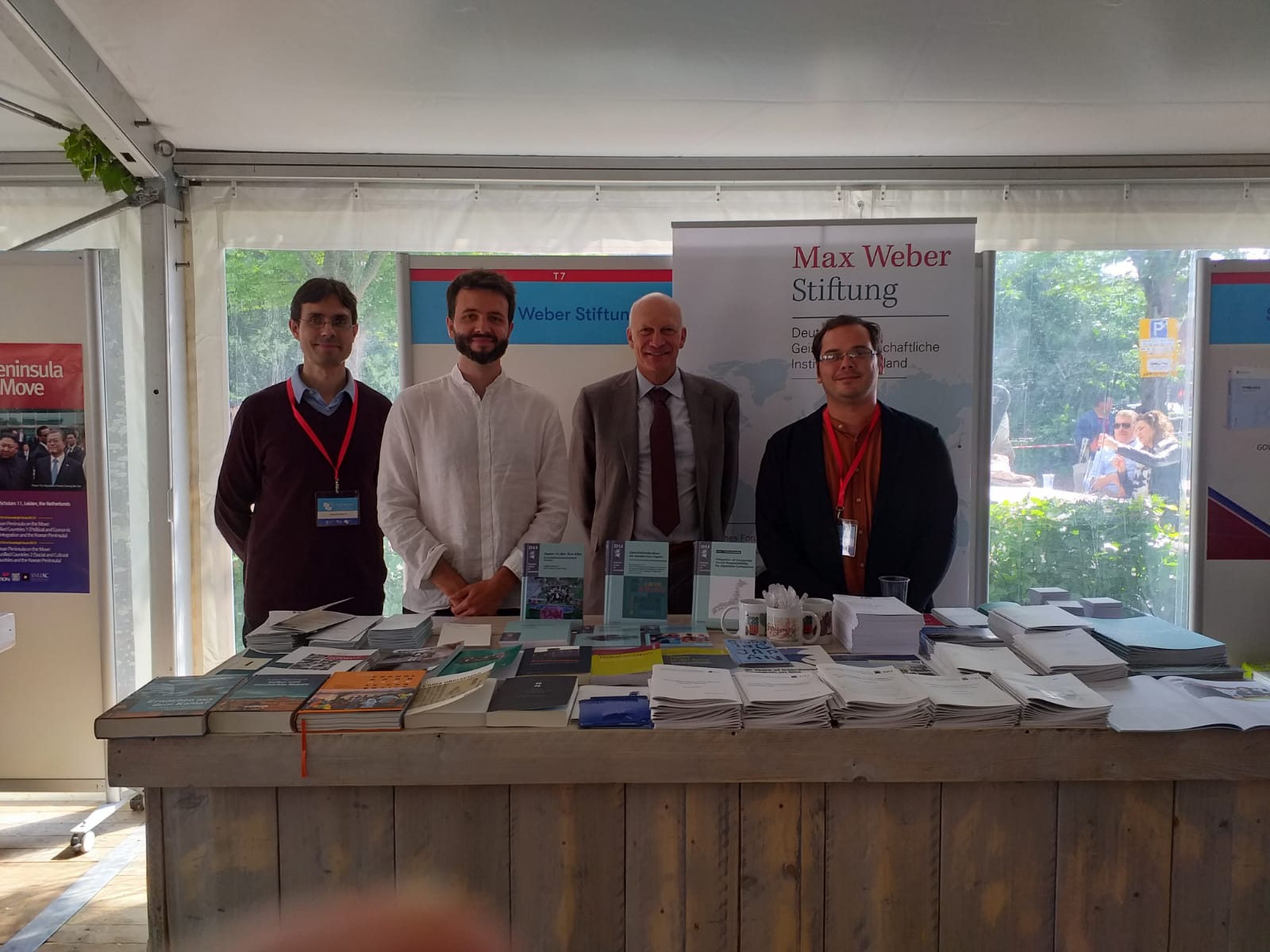
Benjamin Beuerle, Research Fellow at German Historical Institute Moscow, Felix Mallin, Professor Dr. Hans van Ess, President of Trustees of the Max Weber Foundation and Simon Rowedder, at ICAS 11 in Leiden.
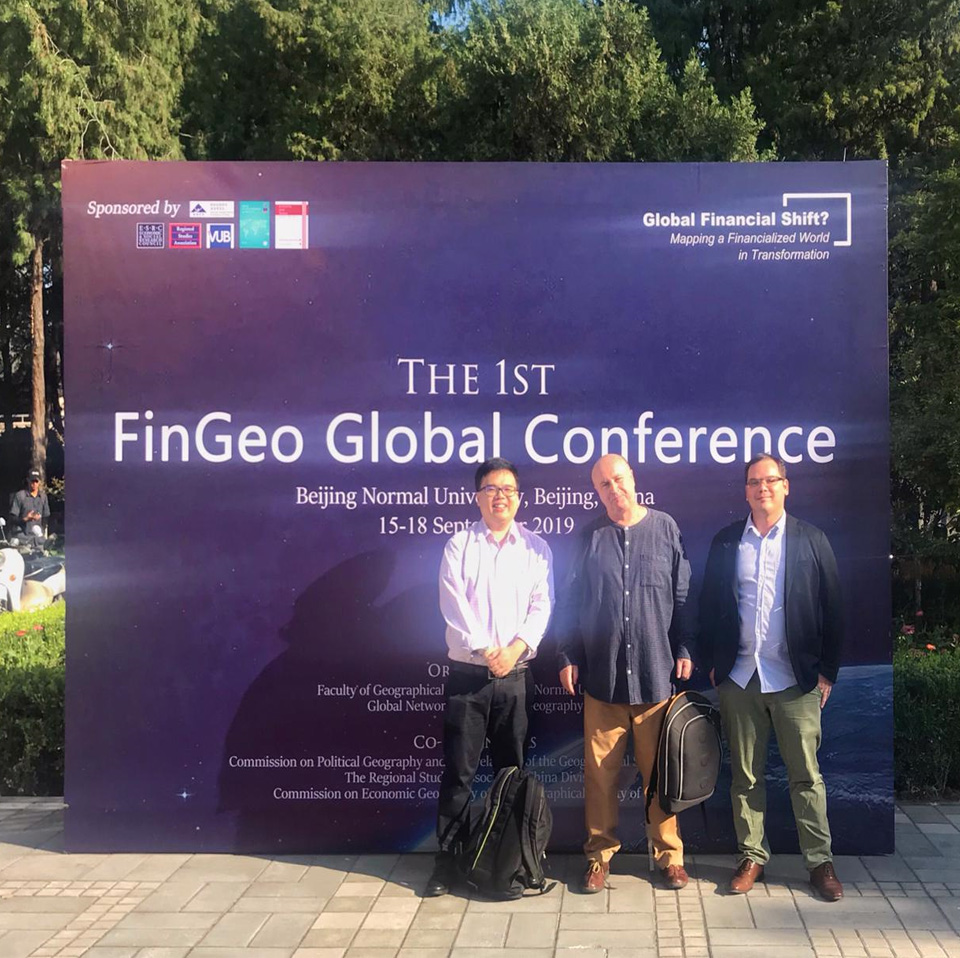
From 15 September 2019 to 18 September 2019, James D Sidaway, along with the group's two postdoctoral fellows, Shaun Lin and Simon Rowedder, attended "The 1st FinGeo Global Conference 2019" in Beijing Normal University, China.
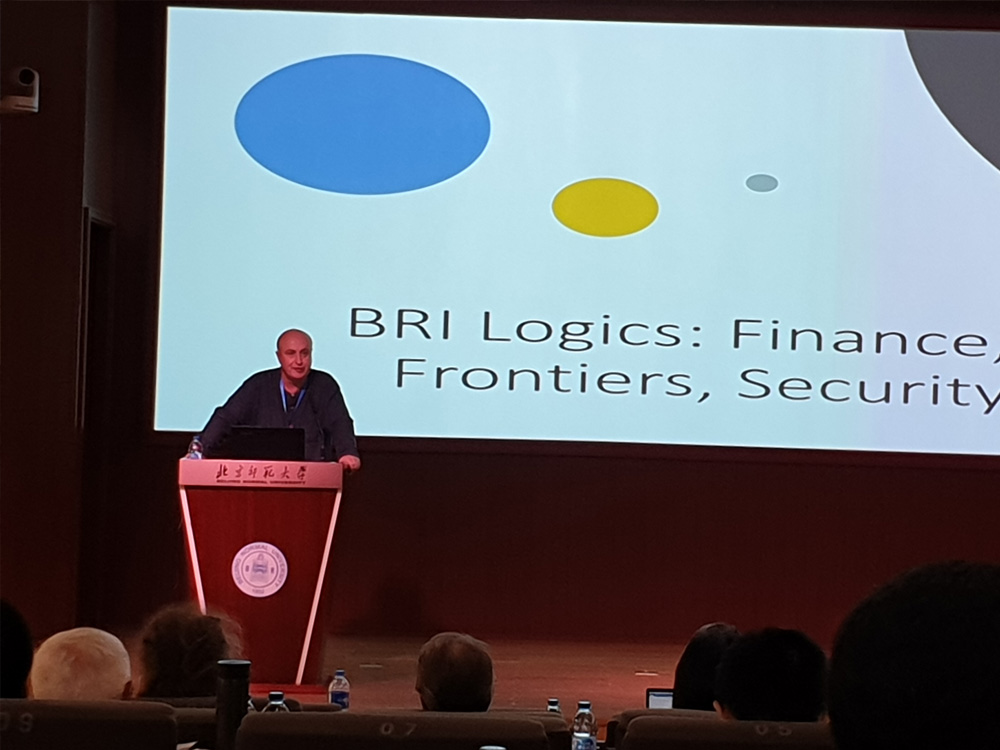
At the September 2019 FinGeo Confrence in Beijing, James D Sidaway spoke about "The Belt and Road Initiative's Logics: Finance, Frontiers, Security" in one of the plenary sessions titled "Global Financial Shift".
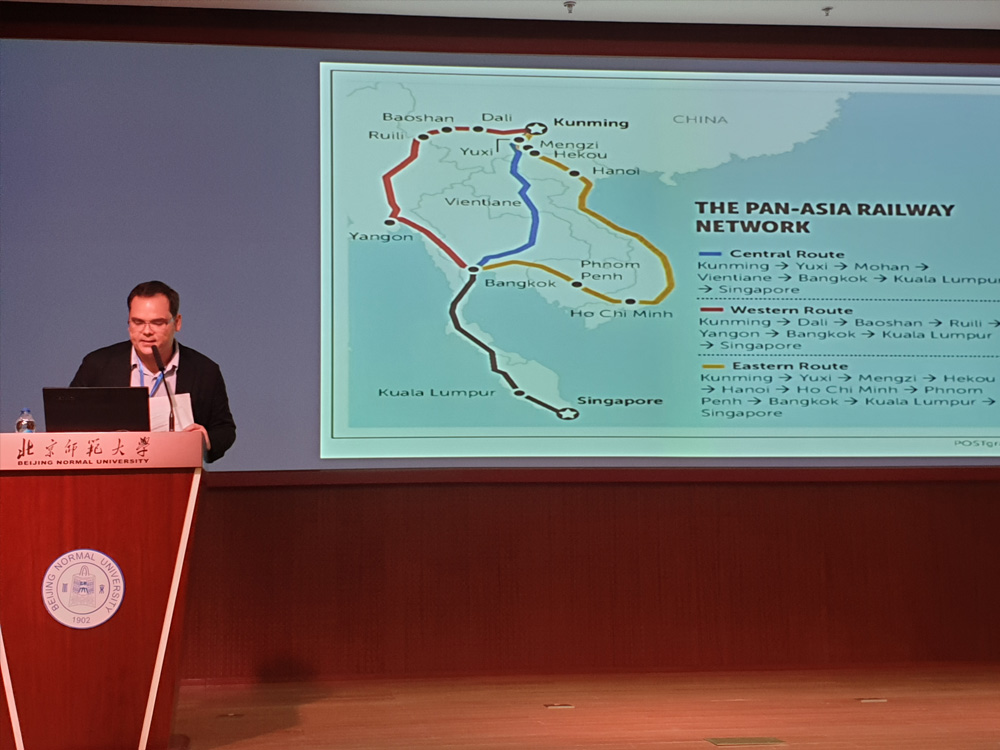
At the September 2019 FinGeo Confrence in Beijing, Shaun Lin chaired a panel session (co-organised with James, and Karen Lai of Durham University) on "Financing the Belt and Road Initiative", where Simon Rowedder presented on "Railroading Land-linked Laos: China’s Regional Profits, Laos’ Domestic Costs?".
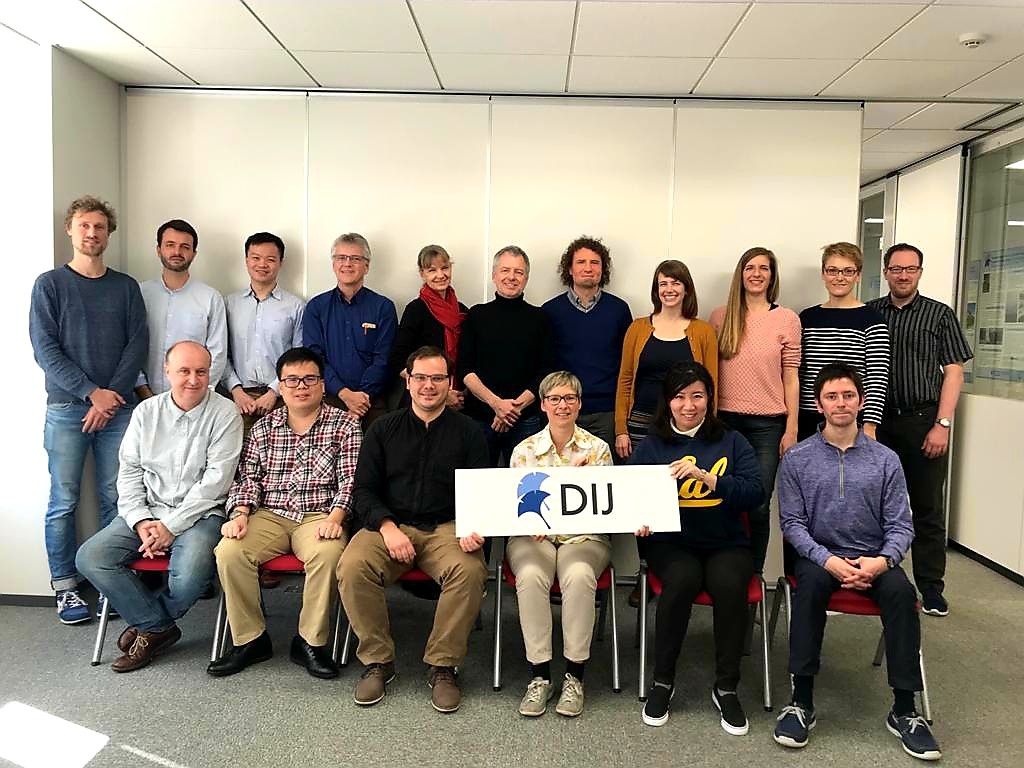
From 2 - 3 December 2019, German Institute for Japanese Studies, Tokyo, hosted six members of the group for a workshop on "Comparisons".
Members
Dr Andrew Carruthers
Department of Anthropology, University of Pennsylvania
Email: acarru@sas.upenn.edu
Profile: https://www.sas.upenn.edu/anthropology/people/andrew-carruthers
Dr Sonja Ganseforth
Deutsche Institut für Japanstudien (DIJ), Tokyo
Email: ganseforth@dijtokyo.org
Profile: https://www.dijtokyo.org/people/sonja-ganseforth/
A/P Douglas Kammen
Department of South East Asian Studies, NUS
Email: seadak@nus.edu.sg
Profile: http://profile.nus.edu.sg/fass/seadak/stf_seadak.htm
Dr Shaun Lin
Max Weber-NUS Research Fellow
Department of Geography, NUS
Email: geolzs@nus.edu.sg
Profile: http://profile.nus.edu.sg/fass/geolzs/
Dr Weiqiang Lin
Department of Geography, NUS
Email: weiqiang@nus.edu.sg
Profile: http://profile.nus.edu.sg/fass/geolinw/stf_geolinw.htm
Dr Felix Mallin
Department of Political Science, University of Copenhagen
Email: felixmallin@ifs.ku.dk
Profile: https://research.ku.dk/search/result/?pure=en/persons/722148
A/P Hendrik Meyer-Ohle
Department of Japanese Studies, NUS
Email: meyerohle@nus.edu.sg
Profile: https://courses.nus.edu.sg/course/jpsmohc/
A/P Yoshinori Nishizaki
Department of Southeast Asian Studies, NUS
Email: seayn@nus.edu.sg
Profile: https://www.fas.nus.edu.sg/sea/about-us/people/faculty.html
A/P Vatthana Pholsena
Department of Southeast Asian Studies, NUS
Email: seavp@nus.edu.sg
Profile: https://fass.nus.edu.sg/sea/people/pholsena-vatthana/
Dr Simon Rowedder
Faculty of Arts and Humanities, University of Passau
Email: simon.rowedder@uni-passau.de
Profile: https://www.phil.uni-passau.de/en/lehrstuehle/development-politics/
Professor Naoko Shimazu
Asia Research Institute, NUS
Email: arishn@nus.edu.sg
Profile:https://ari.nus.edu.sg/people/naoko-shimazu/
Professor James D Sidaway
Department of Geography, NUS
Email: geojds@nus.edu.sg
Profile: http://profile.nus.edu.sg/fass/geojds/

